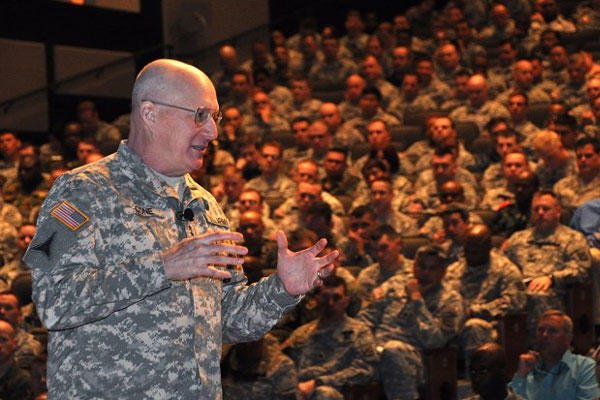FORT BENNING, Ga. -- Despite the Pentagon’s claims of plummeting readiness rates under sequester, Maneuver Center officials here are holding the line on training and in some cases expanding leader development courses.
"We have to replicate the conditions of battle," said Maj. Gen. H.R. McMaster, commanding general of the Army’s Maneuver Center of Excellence, at the 2013 Maneuver Warfighter Conference. "We have to build into our training the things that happen all the time in combat -- change, bad information, casualties. We have got to rush things. We can’t just plan an op in the Captains Career Course and execute that operation as planned -- that never happens."
McMaster’s tone is particularly ambitious these days as senior leaders from all services have been forced to cut training because of massive defense spending cuts under sequestration.
Army Training and Doctrine Command absorbed a 20-percent cut to its 2013 budget, said TraDoc Commander Gen. Robert Cone, adding that he had already committed $3 billion of his $5 billion budget when the cuts hit.
But Cone said he found ways to protect training.
"There are things in my organization that really cost a lot of money, and there are things that don’t and thankfully one of the things that we can do pretty well is that human contact with soldiers in the classroom," he said.
"We are working through a deficit right now because of 12 years of war. We’ve got 35,000 [non-commissioned officers] that haven’t been to the school that is commensurate with their grade," Cone said. "So the worst thing we could do at this point would be to slow down what we have going in the school house."
In some cases, TraDoc is beefing up NCO training to reverse some of the shortcomings created by past course cuts, Cone said.
"Despite the budget crunch, we have made a decision to increase the Warrior Leader course from 15 to 22 days and that was specifically to address shortcomings," Cones said.
Land Navigation training is getting put back into the course.
"We get feedback from the field that these sergeants are completely dependent on a GPS -- you can’t have that. You have to be prepared to go without GPS from time to time."
Sequestration has been a challenge, Cone said, but "I probably took the least amount of cuts of any major command I think because the Army understood in these kinds of environments you really have to invest in the long term."
The bulk of the cuts affected many service contracts, so now soldiers are performing extra duties such as pulling gate guard and driving buses, Cone said.
"A lot of people are doing double duty right now in terms of doing things that people have previously been hired for and soldiers are doing," Cone said.
"We are soldiers, and we are paid to accomplish the mission, but the problem is the risk to the force over time. … When you tinker with training and education, you don’t understand what that impact is until you need it the next time."

























